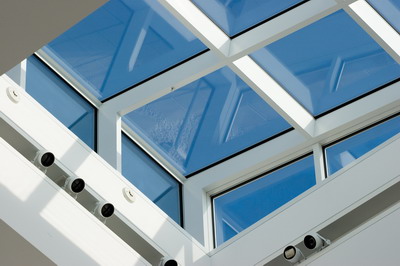The American Architectural Manufacturers Association (AAMA) and the Window and Door Manufacturers Association (WDMA) have jointly released an update to the "2011/2012 U.S. Industry Statistical Review and Forecast." This report delivers timely information on window, door and skylight market trends and product relationships. Historic data for 2006 through 2011 and forecast data for 2012 through 2015 are also included in the report. Forecasts are based on projections of construction activity as of August 2012.
According to the updated study's data, multi-family and single family starts are expected to experience a slightly better increase than what was initially thought, up to 19 percent over 2011 with additional increases in 2013 and 2014. Residential improvement expenditures are expected to see a similar shift.
As of mid-year, residential skylights are tracking at a growth rate slightly higher than the 2011 volume. New construction skylight activity has proven to be greater than expected with double-digit growth percentages. Remodeling and replacement skylight activity has fallen behind initial expectations with only minor growth, though the replacement market is benefiting from weather-related replacement in the first half of the year.
The updated study continues to show little change in the segmentation for residential interior door material types over the next five years. However, significant volume is expected to return to the entry and interior door market as new construction demand is expected to grow at double-digit rates, outpacing remodeling and replacement activity as the housing market recovers.
Nonresidential construction declined slightly in 2011 and is forecasted to continue to remain slow through 2012, tempering growth in the nonresidential architectural interior door categories. However, the updated study predicts a slight improvement in architectural door shipments in 2012 over earlier forecasts. Lagging slightly behind the residential market, nonresidential construction is expected to rebound significantly in the subsequent three years through 2015.
Additional and more detailed information on the residential and commercial fenestration markets is contained in the "2011/2012 AAMA/WDMA Study of the U.S. Market for Windows, Doors and Skylights" (published in May 2012), which includes all of the items listed below.
- "AAMA/WDMA U.S. Industry Statistical Review and Forecast" (August 2012 Update) summarizes residential, nonresidential and remodeling trends from government and industry sources.
- "AAMA/WDMA U.S. Industry Channel Distribution Report" profiles the residential and nonresidential market for windows and doors as it flows through the identified distribution channels.
- "AAMA/WDMA U.S. Industry Market Size Report" quantifies residential and nonresidential market volumes, both historic and projected.
- "AAMA/WDMA U.S. Industry Regional Statistical Review and Forecasts" detail information for 11 individual regions.
The updated "2011/2012 U.S. Industry Statistical Review and Forecast," as well as the other reports listed above, are available for purchase online from both AAMA and WDMA. +
Related Stories
MFPRO+ News | Jun 3, 2024
Seattle mayor wants to scale back energy code to spur more housing construction
Seattle’s mayor recently proposed that the city scale back a scheduled revamping of its building energy code to help boost housing production. The proposal would halt an update to the city’s multifamily and commercial building energy code that is scheduled to take effect later this year.
Mass Timber | May 31, 2024
Mass timber a big part of Western Washington University’s net-zero ambitions
Western Washington University, in Bellingham, Wash., 90 miles from Seattle, is in the process of expanding its ABET-accredited programs for electrical engineering, computer engineering and science, and energy science. As part of that process, the university is building Kaiser Borsari Hall, the 54,000-sf new home for those academic disciplines that will include teaching labs, research labs, classrooms, collaborative spaces, and administrative offices.
Construction Costs | May 31, 2024
Despite challenges, 2024 construction material prices continue to stabilize
Gordian’s Q2 2024 Quarterly Construction Cost Insights Report indicates that supply chain issues notwithstanding, many commodities are exhibiting price normalization.
University Buildings | May 30, 2024
Washington University School of Medicine opens one of the world’s largest neuroscience research buildings
In St. Louis’ Cortex Innovation District, Washington University School of Medicine recently opened its new Jeffrey T. Fort Neuroscience Research Building. Designed by CannonDesign and Perkins&Will, the 11-story, 609,000-sf facility is one of the largest neuroscience buildings in the world.
Architects | May 30, 2024
AE firm Goodwyn Mills Cawood merges with Southland Engineering
Architecture and engineering firm Goodwyn Mills Cawood (GMC) is further expanding its services through a strategic merger with engineering firm Southland Engineering in Cartersville, Ga.
K-12 Schools | May 30, 2024
Inclusive design strategies to transform learning spaces
Students with disabilities and those experiencing mental health and behavioral conditions represent a group of the most vulnerable students at risk for failing to connect educationally and socially. Educators and school districts are struggling to accommodate all of these nuanced and, at times, overlapping conditions.
MFPRO+ New Projects | May 29, 2024
Two San Francisco multifamily high rises install onsite water recycling systems
Two high-rise apartment buildings in San Francisco have installed onsite water recycling systems that will reuse a total of 3.9 million gallons of wastewater annually. The recycled water will be used for toilet flushing, cooling towers, and landscape irrigation to significantly reduce water usage in both buildings.
Healthcare Facilities | May 28, 2024
Healthcare design: How to improve the parking experience for patients and families
Parking is likely a patient’s—and their families—first and last touch with a healthcare facility. As such, the arrival and departure parking experience can have a profound impact on their experience with the healthcare facility, writes Beth Bryan, PE, PTOE, PTP, STP2, Principal, Project Manager, Walter P Moore.
Urban Planning | May 28, 2024
‘Flowing’ design emphasizes interaction at Bellevue, Wash., development
The three-tower 1,030,000-sf office and retail development designed by Graphite Design Group in collaboration with Compton Design Office for Vulcan Real Estate is attracting some of the world’s largest names in tech and hospitality.
MFPRO+ News | May 28, 2024
ENERGY STAR NextGen Certification for New Homes and Apartments launched
The U.S. Environmental Protection Agency recently launched ENERGY STAR NextGen Certified Homes and Apartments, a voluntary certification program for new residential buildings. The program will increase national energy and emissions savings by accelerating the building industry’s adoption of advanced, energy-efficient technologies, according to an EPA news release.

















